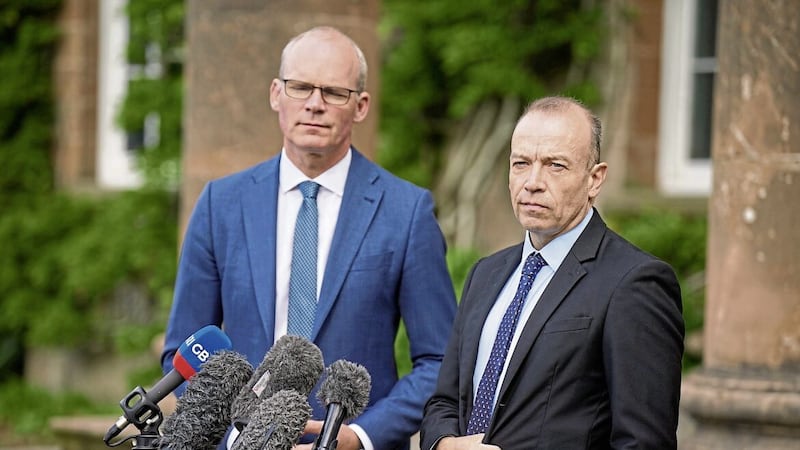Some unionists and loyalists are very cross with the Irish government right now. Indeed, they have been very cross with them since the Brexit referendum.
Personally, I’m not cross with them (cue online pile-on from anonymous unionist/loyalist trolls saying, “but you’re not a proper unionist anyway”). The Irish government is doing exactly what a government is supposed to do: protecting its political and national interests. That’s the whole purpose of governments, surely?
Those same unionists and loyalists are also very cross with the House of Lords as well, accusing some of its members of trying to hijack, ambush and sabotage the government’s NI Protocol Bill. Hmm. The House of Lords is an integral part of the overall sovereignty underpinning parliamentary sovereignty in the UK; the very parliamentary sovereignty which pro-Brexit unionists and loyalists claimed to want when they backed the Leave campaign in 2016. You can’t cherry-pick when it comes to sovereignty, of course and you can’t really complain if the sovereignty doesn’t play out in your favour. It is what it is.
What should concern unionists and loyalists—and the people they should really be cross with—is their own government and the four successive prime ministers since 2015. I remember telling an audience at a speaking event a few years ago that I wished the UK government took as much interest in the concerns of unionism in NI as the Irish government took in underwriting the interests of nationalists here. For good measure I also told them I wished the UK government gave even the merest hint of a genuine emotional attachment to NI as an integral part of the UK.
There’s a tendency, too, among those same elements of unionism and loyalism, to describe the Irish government—particularly Simon Coveney—as hostile and land-grabbing and questioning why it ‘pokes its nose into our business.’ They can complain until they are blue in the face, but the Irish government will not pay any attention unless and until the criticisms come from the NIO or higher sources within the UK government. For the fact of the matter is that the UK government doesn’t have any particular objection to the Irish having a say in NI affairs, let alone the Irish minister for foreign affairs popping across the border any time he feels like it.
If loyalists and unionists want to complain about any aspect of the Irish government’s involvement in NI then the complaints need to be directed at their own government rather than the Irish. Right now, though, the complaints would fall on deaf ears, because the ERG-supporting Liz Truss, James Cleverly, Chris Heaton-Harris and Steve Baker have taken a blowtorch to what had been the permafrost surrounding British/Irish relations for a couple of years. And if the British and Irish, along with the EU, manage to manoeuvre themselves onto the same spot on the same page (which is what they seem determined to do) then those same loyalists and unionists will be even more miffed than they are at the moment.
I don’t actually believe the Irish, British and EU are deliberately hostile to unionism/loyalism. I think they just don’t understand them: and, as I’ve noted before, I don’t think any UK government in my electoral lifetime (I’m going back to 1972) has had any emotional attachment to what might be described as ‘Ulster’ unionism. They don’t understand it. They don’t understand us. As one former secretary of state put it to me: “I have spent a long time talking to various shades of unionism and loyalism and I’m not sure I’m any better informed about their concerns or demands. Quite often the people in the same room disagreed with each other while they were supposedly briefing me.”
I suppose what I’m trying to say in this piece is that it’s pointless complaining if people don’t know what you’re complaining about. Better, surely, to have a well-honed and articulated case to make on your own behalf than to focus relentlessly on what other people are doing? In the run-up to the Good Friday Agreement (and for a few years afterwards) many unionists and loyalists actually had a particularly good relationship with successive Irish governments, even if many of the conversations were on a below-the-radar Chatham House rules basis. Understanding and trust was developed and nurtured.
Brexit changed the circumstances and dynamics for both sides. It didn’t need to mean a closing of the door; although both sides played a part in closing and bolting it in the summer of 2017. Here’s a reality which has to be acknowledged by unionists and loyalists (as it was acknowledged during the negotiations leading to the GFA): no deal which might impact both NI and the RoI will be done if excludes and isolates the Irish government. That’s an understanding which dates back to October 1972 and the copper-fastening of what became known as the ‘Irish dimension.’
I understand why many, probably the majority, of unionists and loyalists are discomfited by what they view as ‘Irish interference’. But since that ‘interference’ is clearly underpinned by the acquiescence of successive UK governments there is no point in unionists and loyalists hollering their protests into the void. So, come up with new strategies instead.








